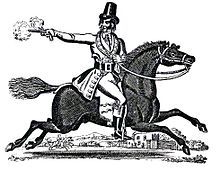Lincolnshire’s Last Highwayman by Jim Snee
 The Georgian period, of the 18th century is probably one of the periods in English history that people will admit knowing very little about. Which is odd, because if historical periods were television series, then the 18th century would be Game of Thrones but with better tailors and a classical soundtrack that would make Tyrion Lannister weep.
The Georgian period, of the 18th century is probably one of the periods in English history that people will admit knowing very little about. Which is odd, because if historical periods were television series, then the 18th century would be Game of Thrones but with better tailors and a classical soundtrack that would make Tyrion Lannister weep.
Of the 18th century, most people will recall two things, piracy (which I have covered elsewhere) and highwayman. And of highwaymen, Lincolnshire certainly had its fair share.
Robbery on the highway has a long history. Lincolnshire would have had footpads and muggards aplenty during the medieval period and probably before. The classical masked and pistol wielding highwayman came a little later with the brief but eventful career of Gamaliel Ratsey. Born in Market Deeping he “took to evil courses as a boy” before enlisting in the English army fighting in Ireland between 1600 and 1603. On returning to England he began steeling horses and robbing people at Spalding and continued for the next two years in Northamptonshire before he was betrayed, captured and executed in 1605. But by then he had already passed into legend, probably because of his habit of wearing a grotesque mask when committing his crimes.
But Gamaliel was just a taste of things to come, in the 18th century Lincolnshire was to play host to one of the most famous highwaymen of all time, Dick Turpin. Dick Turpin’s career has been widely documented, embellished and embroidered elsewhere, so I will merely report that he is known to have stayed in Long Sutton for approximately nine months in 1737 before heading into Yorkshire. His route may have been a circuitous one, certainly if the number of Lincolnshire pubs that connect themselves to his legend is anything to go by.
But Dick Turpin was not the last Highwayman I could find in Lincolnshire. That story begins almost at the end of the 18th century in Burton by Lincoln. On a dark evening in late October 1798, a man known as Abraham the Jew rode along the old coach road that goes past Burton Hall. There at a piece of woodland known as the Cocked Hat, he was waylaid and shot, and all his possessions taken. Suspicions fell upon a local man called Long Tom who had been seen in the Inn that Abraham had stayed in. The Innkeeper reported to the authorities that Tom had come into large amounts of money. Long Tom was arrested and tried, and on the evidence of the Innkeeper, convicted. Before the year was up, he had been publicly hanged at Lincoln Castle.
In 1802, Robert “Robber” Snooks was hanged for highway robbery, the last highwayman in England.
Or was he? Because the story of Long Tom and the murder of Abraham the Jew has one last gasp. After the death of Long Tom, the innkeeper became a wealthy man, and some years after the robbery he fell ill and took to his deathbed. There, in the presence of a magistrate, he made his last confession that it was he who had robbed Abraham and framed Long Tom. And so it was that Lincolnshire’s (and possibly England’s) last highwayman took his last breath.
